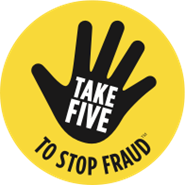
How to avoid being scammed
What would you think if someone knocked on your door and told you that your bank account had been hacked? I suspect you might look at them a little quizzically.
What if they then urged you take precautions by going to a cashpoint and withdrawing money and handing it over to them for safekeeping? You’d definitely smell a rat.
Would you believe them if they showed you some identification that said they were a bank manager? Or if they were wearing a police officer’s uniform?
In any of these instances alarm bells should go off in your head, because the idea is preposterous.
How scammers work
Crooks know that people won’t fall for such an obvious in-person approach, but people do get tricked by villains pretending to be from their bank or the police – online or over the phone.
I don’t know if it’s because they’re caught off guard by a surprise phone call delivered by a smooth-talking fraudster, or an alarming email or text wrapped up in an official-looking presentation.
And scammers have leapt on the current cost of living crisis to invent new ways to try and cheat people out of their precious savings. I’ll be honest – their approach has become extremely sophisticated and can be very convincing. They often use official brand logos and cleverly formatted account information to convince people that they’re genuine.
How to spot a scammer
But you can foil the scammers before they even get going, if you know that a trusted organisation will never ask you for personal information, or your full PIN or password. Your bank or the police would never suggest you transfer money to a ‘safe account’. They wouldn’t send you a specific link to a login page, nor ask you to allow remote access to your computer following a cold call, email or text message.
If ever in doubt, I’d suggest contacting your bank by calling the number on the back of a card or statement, or calling Stop Scams UK on 159 to double check before divulging any information.
Scammers will always look to jump onto something topical. With the current cost-of-living crisis, this year it’s become especially nasty as villains are doing their best to prey on people that are already struggling.
They’re sending bogus messages warning people that they will lose out if they don’t respond immediately, or promising financial help if you follow their instructions.
One evil trick is a phone call from someone claiming to be from a phone or energy supplier, offering help or special discounts to people struggling with costs. There is some genuine help available, but if you get a cold call about it, it will certainly be from a crook.
A similar recent scam is a message that tells people they are eligible for a cost-of-living payment, but only if they respond by a deadline – usually the same day. That’s nonsense too as the government’s cost-of-living assistance was handed out directly to eligible people.
The same goes for cold calls from the tax office pressuring you to pay an outstanding tax bill – the Inland Revenue never calls people to ask for immediate payments.
Top tips on avoiding scams
- It’s always better to avoid clicking on links in text messages and emails, even if they look genuine, so instead type web addresses in yourself.
- You may have heard about the ‘hi mum’ scam where criminals pretend to be a family member using a new phone number to ask for emergency money. My tip is never to reply to unknown numbers that message you out of the blue. Instead, call the family member back on a known number – and never send money unless you’re 100% sure it’s going to the right person.
- The easiest way to get caught out seems to be the dodgy text or email asking you to log into your account. Anyone who falls for this will be taken to a bogus page which asks for personal details. If you’re tricked into putting details in, revealing your PIN or authorising a payment you’ve not initiated yourself, then you’ve effectively handed the keys to your finances to the scammers.
- I can’t stress enough how important it is to be aware of these tricks, always keep your guard up, and remind friends and family about them, especially older people.
The simple rule of thumb is to be sensible and always question cold calls or emails.
It’s awful that crooks are preying on people’s financial fears, but if we’re prepared for the tricks, they will fail. Don’t let them turn the cost-of-living crisis into a financial disaster for you.

About the author
Find out more about avoiding scams

Stop Scams UK
A group of businesses from banking, telecoms and technology who have come together to help stop scams

Take Five to Stop Fraud
A national campaign offering impartial advice on avoiding email, phone and online fraud

Get Safe Online
The UK’s leading source of unbiased, factual and easy-to-understand information on online safety

Action Fraud
The UK’s national reporting centre for fraud and cyber crime